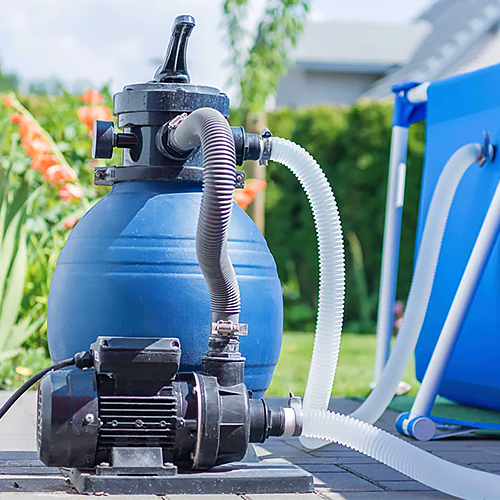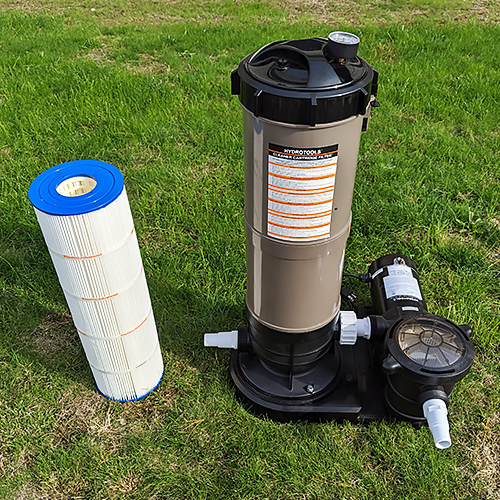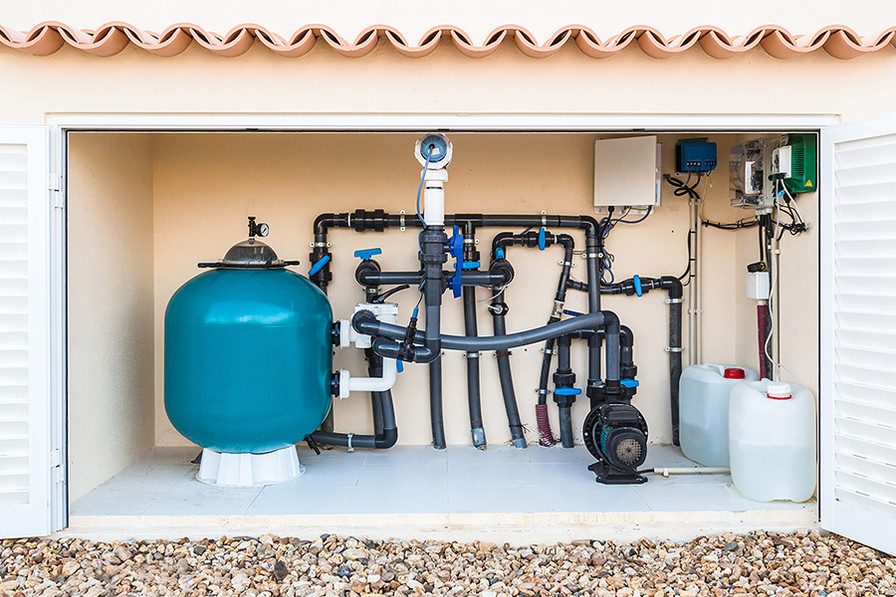Posted by James May on 20th Feb 2022
Sand Filters vs Cartridge Filters... What's The Difference?
One of the most important aspects of owning a pool is keeping the water clean and safe. If you want to ensure that your pool always stays hygienic, it's vital for you to buy a swimming pool filter. Which swimming pool filtration system is the right one for you and your specific needs? The two most popular types of pool filtration systems are sand filters and cartridge filters. There are advantages and disadvantages associated with both types of system. Read this helpful guide to understand how each filter works and decide which variety would be the best choice for your pool!
What are the key differences of sand filters vs. cartridge filters? Both filtration systems are great tools for maintaining a clean pool, although there are some important differences. When deciding which kind of filter to buy, it's vital to understand all of the pros and cons. If you're in the market for a new pool filter, consider your choices carefully before making a purchase. Once you learn about the main benefits and drawbacks of these filters, you can make an informed decision that will be perfect for your pool.
Sand Filters:

Sand filters are the oldest type of filtration system for a swimming pool. These filters work by passing water through a round structure filled with silica sand. The silica sand traps dirt, debris, and particles that were in the water, allowing clean water to flow back out the other end. Sand filters can remove particles that are as small as 20 microns. The silica sand inside the filter can last 5-10 years before needing to be changed.
Sand filter systems require regular maintenance to continue working properly. The way to care for your sand filter is through a process called backwashing. Backwashing pushes clogs and dirty water out through a waste port. This process clears out the filter and removes any sand, dirt, or debris that is clogging up the valves. If you don't backwash your filtration system, the sand will begin to restrict the flow of water and your pressure gauge will start to increase.
Backwashing your sand filter is an important part of routine maintenance. This process typically only takes about 20-30 minutes. However, there are some extra steps that must be completed after backwashing to ensure that your swimming pool stays clean and safe. The process of backwashing lowers the overall water level of your pool and unbalances the ratio of necessary chemicals. When you finish backwashing a sand filter, you will need to refill your pool with water and add the proper amount of chemicals.
Pros
- Removes particles as small as 20 microns
- Inexpensive to buy
- Simple to install and operate
Cons
- Sand must be replaced every 5-10 years
- Requires backwashing and regular maintenance
- Backwashing lowers the water level
- Filters less effectively than cartridge filters
Cartridge Filters:

Cartridge filters are simple 2-piece systems consisting of a lidded tank with a cartridge inside. This cartridge is a fibrous filter that can remove particles as small as 10 microns. As water is pushed through the tank and through the cartridge membrane, any particles, dirt, or debris will become trapped in the fabric. The cartridge can last for about 1-3 years before it needs to be replaced.
Unlike sand filters, cartridge filters require very little maintenance throughout their lifetime. Furthermore, they also use less power and could lead to lower utility bills. Many people prefer using cartridge systems for their pool since they are so low maintenance. Even when you do need to care for your cartridge filter, the cleaning process is very easy. You will know that your cartridge filter needs to be cleaned when the pressure gauge reads 10 psi above the average reading. To maintain the system, simply remove the cartridge from the tank and clean it thoroughly using a hose or another source of high-pressure water. Cleaning the cartridge filter should only take about 5-10 minutes.
Pros
- Removes particles as small as 10 microns
- Easy to clean and simple maintenance
- Uses less power overall
- Has little effect on the water flow or water level
Cons
- More expensive to buy
- May not be suitable for some large pools
- Requires regular cleaning
How Does Pool Size Affect the Filter You Need?
The size of your swimming pool will play a huge role in determining the type of pool filter and the pool pump that is right for you. If your filter and pump are the wrong size for your pool, the whole system will not function correctly. Before you decide on a pool filter, make sure you understand the key differences between the systems and what type of pump is required. Cartridge filters are an excellent option for most consumers, however, this type of system may not work for large pools.
It's important to select the right swimming pool filter based on the size of your structure. The flow rate of pool filters are rated by gallons per minute per square foot. This flow rate must be rated at the same level or higher as your pool pump. When choosing the size of your filter, the safest option is to buy a larger size than you might expect. This is especially true for cartridge filters, which work great for smaller pools but may not be appropriate for larger structures. If you have a very large pool, a sand filter could be the best choice for you. Along with just considering the type of filtration system, always make sure that you take the size of your pool into consideration too.
Not sure what size of swimming pool is right for you?
Click Here to learn about the differences between Above Ground & In-Ground Pools!
Are Cartridge Filters the Best Option for Your Swimming Pool?
Both filtration systems have some advantages and disadvantages, but a cartridge filter is likely the best choice for you if you own an above ground pool. Cartridge filters are more efficient and remove more contaminants from the water than sand filters. While cartridge filters can remove particles as small as 10 microns, sand filters can typically only filter out dirt and debris that is 20 microns. Along with being more effective, cartridge filters also require significantly less maintenance.
In the end, the pool filtration system that's right for you will be the one that best meets your specific needs. Are you looking for an efficient filter that requires very little maintenance? If that's the case, the cartridge filter may be the perfect option for you. On the other hand, if you're on a tight budget and don't mind taking the time to perform routine backwashing, then the sand filter could be a good choice. Whichever type of filtration system you end up purchasing, there will be some level of maintenance and cleaning involved. At the end of the day, the most important thing is that your pool water stays safe, clean, and hygienic. The differences between sand filters and cartridge filters are vast even though they perform the same function. Once you understand the key differences between the two systems, you will be able to make the perfect purchase for your pool!
You can browse our range of Replacement Pool Filter Cartridges Here!
Looking for a Spa Filter Replacement instead? We have you covered!
About the Author:
JAMES MAY
James is the Head of Content & Multimedia for PoolSpaZone & Revenew Group.
With a background in copywriting and graphic design, his new obsession is complete mastery of the pool and spa industry!

